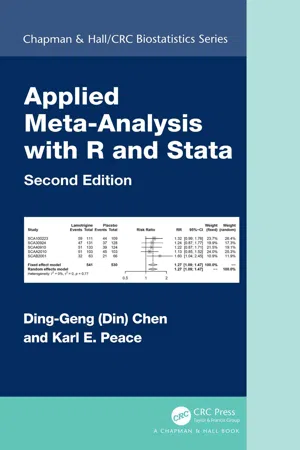
- 424 pages
- English
- ePUB (mobile friendly)
- Available on iOS & Android
Applied Meta-Analysis with R and Stata
About this book
Review of the First Edition:
The authors strive to reduce theory to a minimum, which makes it a self-learning text that is comprehensible for biologists, physicians, etc. who lack an advanced mathematics background. Unlike in many other textbooks, R is not introduced with meaningless toy examples; instead the reader is taken by the hand and shown around some analyses, graphics, and simulations directly relating to meta-analysis… A useful hands-on guide for practitioners who want to familiarize themselves with the fundamentals of meta-analysis and get started without having to plough through theorems and proofs.
—Journal of Applied Statistics
Statistical Meta-Analysis with R and Stata, Second Edition provides a thorough presentation of statistical meta-analyses (MA) with step-by-step implementations using R/Stata. The authors develop analysis step by step using appropriate R/Stata functions, which enables readers to gain an understanding of meta-analysis methods and R/Stata implementation so that they can use these two popular software packages to analyze their own meta-data. Each chapter gives examples of real studies compiled from the literature. After presenting the data and necessary background for understanding the applications, various methods for analyzing meta-data are introduced. The authors then develop analysis code using the appropriate R/Stata packages and functions.
What's New in the Second Edition:
- Adds Stata programs along with the R programs for meta-analysis
- Updates all the statistical meta-analyses with R/Stata programs
- Covers fixed-effects and random-effects MA, meta-regression, MA with rare-event, and MA-IPD vs MA-SS
- Adds five new chapters on multivariate MA, publication bias, missing data in MA, MA in evaluating diagnostic accuracy, and network MA
Suitable as a graduate-level text for a meta-data analysis course, the book is also a valuable reference for practitioners and biostatisticians (even those with little or no experience in using R or Stata) in public health, medical research, governmental agencies, and the pharmaceutical industry.
Tools to learn more effectively

Saving Books

Keyword Search

Annotating Text

Listen to it instead
Information
1
1.1 Introduction to R for Meta-Analysis
1.1.1 What is R?
1.1.2 Steps on Installing R and Updating R Packages
http://CRAN.r-project.org
1.1.2.1 First Step: Install R Base System
http://CRAN.r-project.org
http://CRAN.r-project.org/bin/windows/base/release.htm
Table of contents
- Cover
- Half Title
- Series Page
- Title Page
- Copyright Page
- Dedication
- Table of Contents
- Preface for the Second Edition
- Preface for the First Edition
- Authors
- List of Figures
- List of Tables
- 1 Introduction to R and Stata for Meta-Analysis
- 2 Research Protocol for Meta-Analyses
- 3 Fixed Effects and Random Effects in Meta-Analysis
- 4 Meta-Analysis with Binary Data
- 5 Meta-Analysis for Continuous Data
- 6 Heterogeneity in Meta-Analysis
- 7 Meta-Regression
- 8 Multivariate Meta-Analysis
- 9 Publication Bias in Meta-Analysis
- 10 Strategies to Handle Missing Data in Meta-Analysis
- 11 Meta-Analysis for Evaluating Diagnostic Accuracy
- 12 Network Meta-Analysis
- 13 Meta-Analysis for Rare Events
- 14 Meta-Analyses with Individual Patient-Level Data versus Summary Statistics
- 15 Other R/Stata Packages for Meta-Analysis
- Bibliography
- Index
Frequently asked questions
- Essential is ideal for learners and professionals who enjoy exploring a wide range of subjects. Access the Essential Library with 800,000+ trusted titles and best-sellers across business, personal growth, and the humanities. Includes unlimited reading time and Standard Read Aloud voice.
- Complete: Perfect for advanced learners and researchers needing full, unrestricted access. Unlock 1.4M+ books across hundreds of subjects, including academic and specialized titles. The Complete Plan also includes advanced features like Premium Read Aloud and Research Assistant.
Please note we cannot support devices running on iOS 13 and Android 7 or earlier. Learn more about using the app